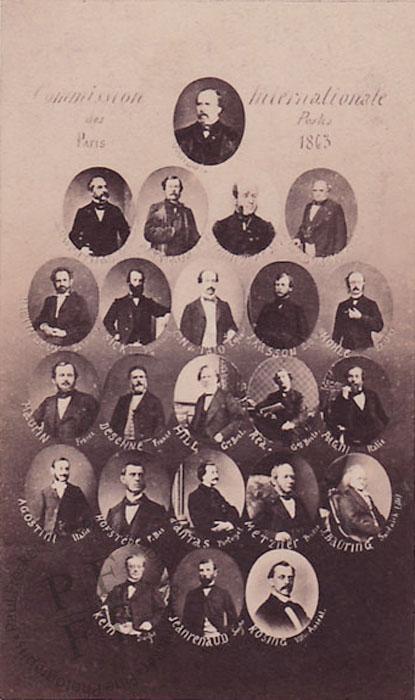International Postal Congress of 1863
The first International Postal Congress was held in Paris in 1863; the conference was attended by twenty-three delegates from fifteen different countries.
It was at one time necessary not only for each country to negotiate separate postal treaties with every other country to which it wished to send mail, but also for a letter to bear the national stamps of each country that it traversed in transit. The situation was further complicated by the absence of any uniformity in the postal rates charged by different countries. The United States called for an international congress to discuss the problems, and this was held in Paris in 1863. This eventually led to the foundation of the General Postal Union, the oldest international postal organization, created as a result of the Treaty of Berne (1874). Its name was changed to the Universal Postal Union in 1878, and today has 189 member nations.
The Universal Postal Union established that there should be more or less flat rates (dependant on weight) to mail a letter anywhere in the world, that postal authorities should give equal treatment to domestic and foreign mail, and that each country should retain all monies collected for international postage. Another important result was that all member nations accepted the stamps of other member nations.
This carte-de-visite by Disdéri shows various delegates to that first congress held in Paris in 1863. Countries represented include France, Austria, Italy, Belgium, Prussia, Great Britain, the United States, Spain, Portugal, Denmark, the Netherlands, the Sandwich Isles, Switzerland and the Hanseatic cities (principally Hamburg, Bremen and Lübeck).
According to a report in the Times (Thursday 14 May 1863): ‘A meeting of the congress appointed by the different European Governments for the purpose of establishing a general system of international postage was held on Monday, at the Hotel des Postes, consisting of the following members:- For Austria, M. Lowenthal, Councillor of the Ministry of Commerce; Belgium, M. Fassiaux, Director-General of Railways, Post-offices and Telegraphs; Denmark, M. Martin Levy, Secretary of the Danish Ministry of Finance; Spain, Count de Nava de Tajo, Sub-Director of the Department of Foreign Relations in Spain; United States, Mr. Kasson, Deputy Postmaster-General of the United States, and Mr. Mohle, Assistant; France, M. Vandal, Councillor of State, Directeur-Général des Postes, and M. Maurin, Head of Foreign Correspondence at the French Post-office; Great Britain, Mr. F. Hill, Secretary to the General Post-office; Italy, Chevalier Pagni, Inspector-General of Italian Post-offices, and Chevalier Agostini, head of section in that department; Holland, M. J. Hofstede, Inspector of the Central Dutch Post-office; Portugal, Chevalier d’Autas, Councillor and Secretary of the Legation at Paris; Prussia, M. Metzner, Superior Councillor of the Post-office in Berlin; Sandwich Isles [Hawaii], Sir John Bowring; Switzerland, M. Kern, Swiss Minister-Plenipotentiary at Paris, and M. Paul Jeanrenaud; Hanse Towns, M. Johannes Rosing, Secretary of Legation. The object of the congress is to introduce, not only a uniform system of payment, but of weight and general postal legislation, and to turn to account, in the general correspondence between civilized nations, such improvements as have been found practicable and useful.’
The above report misses out several names and one country that appear in Disdéri’s composite portrait of the delegates: Thimister, a second delegate from Belgium; Rea, a second delegate from Great Britain (a rephotographed Silvy portrait, judging by the background); Sick, a second delegate from Denmark; Desenne, a third delegate from France; and L. de Lurcy, a delegate from Costa Rica.
Unusually, none of the medallioned portraits appear to be the work of Disdéri’s studio, so each delegate must have been approached with a request to provide his own portrait.

